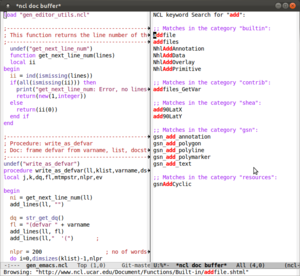Difference between revisions of "Ncl"
Jump to navigation
Jump to search
(Created page with "l") |
m |
||
| (9 intermediate revisions by 2 users not shown) | |||
| Line 1: | Line 1: | ||
| − | + | {{Package | |
| + | |name=ncl-mode | ||
| + | |description=ncl-mode for editing NCL files. | ||
| + | |maintainer=Yagnesh | ||
| + | |source=http://github.com/yyr/ncl-mode | ||
| + | |in_emacs=no | ||
| + | |Development status=active | ||
| + | |website=http://github.com/yyr/ncl-mode | ||
| + | }} | ||
| + | |||
| + | '''NCL''' (NCAR Command Language) is a popular language in the field of Earth science. It processes and displays scientific data efficiently. | ||
| + | . | ||
| + | |||
| + | ==ncl-mode== | ||
| + | |||
| + | '''NOTE:''' There are two version of ncl.el. One is the | ||
| + | [http://www.ncl.ucar.edu/Applications/Files/ncl.el official ] | ||
| + | version by NCL folks which contains only ncl.el. The forked version | ||
| + | contains few fixes to ncl.el and and ncl-doc el and other goodies to | ||
| + | be used by other Emacs packages | ||
| + | |||
| + | === Basic Setup === | ||
| + | To activate ncl-mode automatically for all files with an | ||
| + | [[file extension | extension ]] ".ncl" add add the following your [[.emacs]] | ||
| + | |||
| + | <syntaxhighlight lang="lisp"> | ||
| + | (setq auto-mode-alist (cons '("\.ncl$" . ncl-mode) auto-mode-alist)) | ||
| + | (autoload 'ncl-mode "~/bin/ncl.el") | ||
| + | </syntaxhighlight> | ||
| + | |||
| + | ==ncl-doc-mode == | ||
| + | [[File:Ncl-doc-usage.png|300px|thumb|right|screen shot shows the ncl-doc-mode in actions]] | ||
| + | '''ncl-doc''' minor mode helps you read NCL documentation from UCAR website | ||
| + | |||
| + | === Basic Setup=== | ||
| + | to start ncl-doc-mode for each ncl buffer add the following your [[.emacs]] | ||
| + | <syntaxhighlight lang="lisp"> | ||
| + | |||
| + | (require 'ncl-doc) | ||
| + | (add-hook 'ncl-mode-hook | ||
| + | (lambda () | ||
| + | (ncl-doc-minor-mode 1))) | ||
| + | |||
| + | </syntaxhighlight> | ||
| + | |||
| + | === Usage === | ||
| + | ; {{CommandKeys|C-c C-s| ncl-doc-query-at-point}} | ||
| + | :This function does few things. | ||
| + | ::1) It prompts for a string/keyword and collects a given string | ||
| + | ::2) It tries to find a URL for the given string | ||
| + | ::: + if it finds URL for the string call the browser to open that URL | ||
| + | ::: + If no URL is found, then goes on to search for the given string. | ||
| + | ::: + Displays all search matches in separate buffer category wise. In that buffer RET in any search match will call browser for take you to that page. | ||
| + | ::: + If no matches found for a given string it leaves you there | ||
| + | |||
| + | ; {{CommandKeys|C-c C-o| ncl-doc-query-open}} | ||
| + | : Use this function you lets you choose from the all keywords ncl-doc has in its database and takes you to that page. | ||
| + | |||
| + | [[Category:Programming languages]][[Category:Sciences]] | ||
Latest revision as of 05:53, 29 December 2013
| Description | ncl-mode for editing NCL files. |
|---|---|
| Author | name of author |
| Maintainer | Yagnesh |
| Source | http://github.com/yyr/ncl-mode |
| Part of Emacs | no |
NCL (NCAR Command Language) is a popular language in the field of Earth science. It processes and displays scientific data efficiently. .
ncl-mode
NOTE: There are two version of ncl.el. One is the official version by NCL folks which contains only ncl.el. The forked version contains few fixes to ncl.el and and ncl-doc el and other goodies to be used by other Emacs packages
Basic Setup
To activate ncl-mode automatically for all files with an extension ".ncl" add add the following your .emacs
(setq auto-mode-alist (cons '("\.ncl$" . ncl-mode) auto-mode-alist))
(autoload 'ncl-mode "~/bin/ncl.el")
ncl-doc-mode
ncl-doc minor mode helps you read NCL documentation from UCAR website
Basic Setup
to start ncl-doc-mode for each ncl buffer add the following your .emacs
(require 'ncl-doc)
(add-hook 'ncl-mode-hook
(lambda ()
(ncl-doc-minor-mode 1)))
Usage
- [C-c C-s] (or M-x ncl-doc-query-at-point)
- This function does few things.
- 1) It prompts for a string/keyword and collects a given string
- 2) It tries to find a URL for the given string
- + if it finds URL for the string call the browser to open that URL
- + If no URL is found, then goes on to search for the given string.
- + Displays all search matches in separate buffer category wise. In that buffer RET in any search match will call browser for take you to that page.
- + If no matches found for a given string it leaves you there
- [C-c C-o] (or M-x ncl-doc-query-open)
- Use this function you lets you choose from the all keywords ncl-doc has in its database and takes you to that page.
